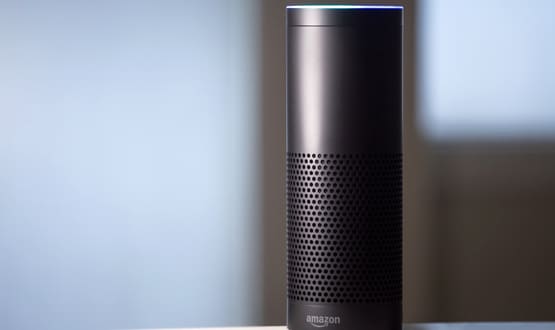Privacy organisation raises concerns over NHS and Amazon deal

A privacy organisation has raised concerns about the NHS’ partnership with Amazon which allows the tech giant to use NHS data for free on its Alexa platform.
UK-based advocacy group Privacy International is claiming the information could allow Amazon to make, advertise and sell their own products based on what it’s collected from the NHS.
In July, the government announced the partnership which would bring verified health information to people’s homes in a bid to reduce pressure on GPs and other NHS services.
Amazon’s algorithms would be given permission to trawl information on NHS websites to provide answers to common health questions like: “How do I treat a migraine?”. At the time it sparked concerns about safety regarding the handling of patient data.
But the freedom of information requests from Privacy International reveal the US-based company could be gaining more than just access to information on NHS websites.
Amazon was originally expected to gain access to healthcare information on symptoms, causes, medical definitions and other material in order for Alexa to offer verified advice when requested.
“In addition to the content of the NHS website and the right to use the NHS logo, they are also granting Amazon access to their Application Programming Interface (API),” the UK-based advocacy group said in a report.
The contract, which has large chunks relating to what the NHS is granting Amazon redacted, states the NHS (licensor) grants Amazon royalty-free access to programme interfaces; use of any systems, programmes or software made available through APIs; and access to archival copies of the API.
This access is to allow them to do the following, either directly or through third parties: “Design, develop, evaluate, port, test and configure, products, applications, cloud-based services and/or distributed software that provide end users to access licensor content.”
Privacy International’s report suggests Amazon “is not making the NHS any promise, beyond guaranteeing it will give an attribution to the NHS when the NHS content is being quoted.”
In their own testing of the service staff found that Alexa didn’t have answers to questions surrounding sexual health and gender dysphoria, despite the information being available on NHS websites.
For other questions, including “my period is late, what should I do?” and other women’s health issues, Alexa provided answers that did not come from the NHS.
“We should not be naïve about the intentions of big companies that are preying over the NHS,” the report said.
“The agreement between the Department of Health and Amazon seems to clearly allow the latter to use the information provided on the NHS website for a handful of purposes, including advertising or marketing. As Amazon is already making or planning to make moves into healthcare, we find this alarming.
“The NHS must not become another advertising asset for big tech companies, nor should we take the risk to see cuts to traditional helplines and sources of information. It needs to remain accessible to those who cannot afford or choose not to have an Alexa device.”
Privacy International called on the Department of Health to be “more transparent” and put public interest above the commercial interests of Amazon.
A spokesperson for NHS England said: “No patient data is being provided to this company by the NHS, which takes data privacy extremely seriously and has put appropriate safeguards in place to ensure information is used correctly.”
A spokesperson for Amazon added: “Alexa does not have access to any personal or private information from the NHS. General health-related content from the NHS website has been freely available to the public and is now available to Alexa users via voice technology.
“The new option is particularly useful for those with accessibility needs who may not have been able to easily access nhs.uk content via a mobile device or computer in the past.”




